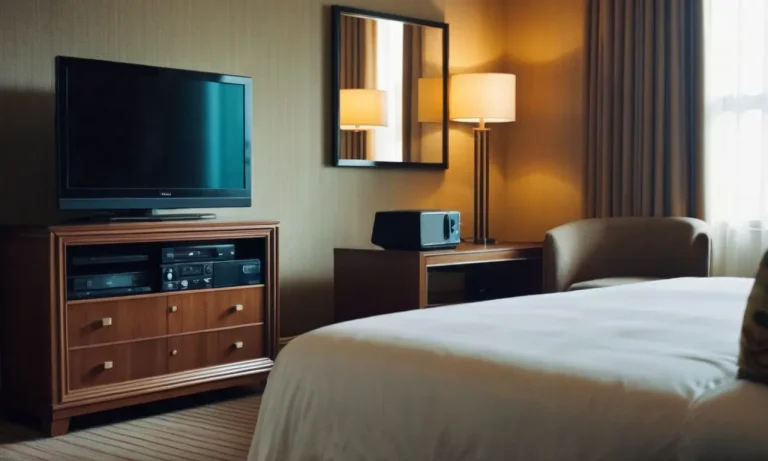How Much Does It Cost to Live in a Hotel? A Comprehensive Guide
Imagine waking up in a luxurious hotel room, with a breathtaking view and impeccable service at your fingertips. While the allure of hotel living is undeniable, the cost can be a significant factor in determining whether it’s a viable option for you.
If you’re short on time, here’s a quick answer to your question: The cost of living in a hotel can vary greatly, ranging from a few hundred dollars per month for a budget hotel to tens of thousands for a high-end luxury establishment.
Factors such as location, amenities, room size, and length of stay play a crucial role in determining the overall cost.
In this comprehensive guide, we’ll delve into the intricate details of hotel living costs, exploring various factors that influence the price tag. From budget-friendly options to lavish accommodations, we’ll provide you with the knowledge to make an informed decision that aligns with your lifestyle and financial considerations.
Location, Location, Location
When it comes to hotel costs, the location plays a pivotal role. The adage “location, location, location” rings true, as the city or region where the hotel is situated can significantly impact the nightly rates. Let’s delve into the factors that influence hotel prices based on their locations.
City vs. Suburban Hotels
Hotels in major metropolitan areas tend to be more expensive than those in suburban or rural areas. Cities like New York, London, and Tokyo are renowned for their high-end hotels, catering to business travelers and tourists alike.
According to Statista, the average daily rate for hotels in urban areas in the United States was around $135 in 2021, while suburban hotels averaged around $105 per night.
Popular Tourist Destinations
Locations that attract a high volume of tourists, such as beach resorts, ski towns, or historic cities, often command higher hotel prices, especially during peak seasons. For instance, hotels in Hawaii can cost upwards of $300 per night during the winter months, when tourists flock to escape the cold weather.
Similarly, hotels in Aspen, Colorado, can charge exorbitant rates during the ski season, with some rooms costing over $1,000 per night.
Off-Season vs. Peak Season Rates
Hotel rates can fluctuate significantly depending on the season. During peak seasons, when demand is high, hotels can charge premium rates. Conversely, during off-peak or shoulder seasons, hotels may offer discounted rates to attract more guests.
For example, hotels in Florida often have lower rates during the summer months when the weather is hot and humid, but prices soar during the winter when snowbirds flock to the Sunshine State.
According to Hotel News Resource, the average hotel occupancy rate in the United States can range from as low as 50% during off-peak seasons to over 80% during peak travel periods. This supply-and-demand dynamic allows hotels to adjust their rates accordingly, with prices skyrocketing during high-demand periods and dropping during low-demand times.
Here are some examples of how location can impact hotel costs:
- A hotel in downtown New York City could cost $300-$500 per night, while a hotel in a nearby suburb might cost $150-$250.
- A beachfront resort in Cancun, Mexico, could charge $400-$800 per night during the peak winter months but drop to $200-$400 during the off-season.
- A ski resort in Vail, Colorado, might charge $600-$1,000 per night during the winter ski season but drop to $200-$400 in the summer.
As you can see, the location of a hotel plays a crucial role in determining its nightly rates. Whether you’re seeking a city getaway, a beach escape, or a mountain adventure, understanding the impact of location on hotel costs can help you plan your vacation budget more effectively and find the best deals for your desired destination.
Hotel Amenities and Services
Room Size and Type
When considering the cost of living in a hotel, the size and type of room you choose can significantly impact your overall expenses. Hotels typically offer a range of room options, from cozy single rooms to luxurious suites. The larger the room, the higher the nightly rate will be.
For instance, according to Statista, the average daily rate for a standard hotel room in the United States was around $130 in 2021, while the rate for a suite could be upwards of $300 or more. 😲 It’s crucial to determine your space requirements and strike a balance between comfort and affordability.
On-Site Dining and Entertainment
Many hotels offer on-site dining options, ranging from casual cafes to upscale restaurants. While the convenience of having these amenities at your fingertips can be great 👍, the costs can quickly add up.
A simple breakfast at a hotel restaurant can easily cost $20 or more per person, and a fancy dinner could set you back $50 or more per person. Additionally, some hotels have bars, lounges, and entertainment venues, which can be tempting but also pricey.
To keep costs under control, consider exploring nearby restaurants or stocking up on snacks and drinks from a local grocery store.
Fitness Centers and Spas
Staying fit and relaxed while living in a hotel can be a challenge, but many hotels offer fitness centers and spas to cater to their guests’ wellness needs. Access to these amenities often comes with an additional fee or is included in a resort fee.
For example, Sheraton Grand Los Angeles charges a daily resort fee of $30, which covers access to their fitness center and pool. Can’t you just feel the luxury? 😍 However, some hotels may offer complimentary access to their fitness facilities, so it’s essential to inquire about the specific policies and fees.
Business and Conference Facilities
If you’re a business traveler or need to attend conferences while living in a hotel, the cost of utilizing these facilities can quickly add up. Many hotels charge fees for using their business centers, meeting rooms, and audio/visual equipment.
According to Cvent, the average cost of renting a small meeting room in the United States is around $400 per day, while larger conference spaces can cost thousands of dollars per day. Additionally, hotels may charge for internet access, printing, and other business services.
To avoid these extra costs, consider using co-working spaces or negotiating package deals with the hotel.
Remember, the cost of living in a hotel can vary greatly depending on your specific needs and preferences. By carefully evaluating your requirements and researching hotel amenities and fees, you can make an informed decision and budget accordingly.
Length of Stay and Discounts
When it comes to living in a hotel, the length of your stay can significantly impact the overall cost. Hotels typically offer different rates for daily, weekly, and monthly stays, with longer stays often resulting in substantial discounts.
Understanding these rate structures can help you make an informed decision and potentially save a considerable amount of money.
Daily, Weekly, and Monthly Rates
Daily rates are the standard rates charged by hotels for overnight stays. These rates are typically higher than weekly or monthly rates, as hotels aim to maximize revenue from short-term guests. However, for travelers who only need accommodation for a few nights, daily rates may be the most convenient option.
Weekly rates, on the other hand, offer a discounted rate for stays of seven consecutive nights or more. These rates can be significantly lower than the cumulative cost of daily rates for the same period.
Many hotels offer weekly rates to cater to business travelers, consultants, or those on extended vacations.
Monthly rates are designed for guests who plan to stay for an extended period, usually 30 days or more. These rates can be substantially lower than daily or weekly rates, making them an attractive option for long-term stays.
Monthly rates are often favored by those relocating to a new area, individuals undergoing medical treatment, or professionals on extended assignments.
Extended Stay Discounts
In addition to the standard rate structures, many hotels offer extended stay discounts for guests who book longer stays upfront. These discounts can range from 10% to 30% or more, depending on the hotel’s policy and the length of the stay.
By committing to a longer stay, guests can enjoy significant savings compared to booking multiple shorter stays.
Extended stay discounts are particularly beneficial for those who need temporary housing during a home renovation, relocation, or extended work assignment. It’s always worth inquiring about these discounts when booking a hotel stay, as they can substantially reduce the overall cost of your accommodation.
Corporate and Group Rates
Hotels often provide special rates for corporate clients and groups. Corporate rates are negotiated between the hotel and companies that frequently book accommodations for their employees or clients. These rates are typically lower than standard rates and may include additional amenities or services.
Group rates, on the other hand, are offered to large groups of travelers, such as weddings, conferences, or sports teams. By booking a block of rooms, groups can secure discounted rates and additional perks, such as complimentary meeting spaces or discounted catering services.
To take advantage of corporate or group rates, it’s essential to inquire with the hotel or your company’s travel department. Many reputable websites, such as Hotels.com Corporate Travel, also provide access to corporate and group rates for eligible individuals or organizations.
It’s worth noting that while discounts can significantly reduce the cost of living in a hotel, additional expenses like meals, parking, and incidentals should also be factored into the overall budget.
By understanding the various rate structures and discounts available, you can make an informed decision and potentially save a substantial amount of money during your extended hotel stay.
Budget-Friendly Hotel Living Options
Living in a hotel doesn’t have to break the bank! There are plenty of affordable options for those seeking temporary or long-term accommodations. Don’t let the high prices of luxury hotels discourage you – with a little research and flexibility, you can find a comfortable and budget-friendly hotel living situation that meets your needs.
Hostels and Budget Chains
Hostels are the ultimate in low-cost accommodations, often offering shared dorm-style rooms for as little as $10-20 per night. While spartan, hostels provide a bed, shared bathroom facilities, and sometimes a communal kitchen. They’re perfect for solo travelers or those on a shoestring budget.
Budget hotel chains like Motel 6, Red Roof Inn, and Travelodge offer cheap private rooms, usually $50-100 per night. According to BudgetTravel.com, the top budget hotel chains in the U.S. for value and amenities are Microtel Inn & Suites, Fairfield Inn, and Hampton Inn.
Apartment-Style Hotels
For longer stays, apartment-style hotels (or “extended stay” hotels) offer a home-like experience at a reasonable cost. Brands like Extended Stay America, Residence Inn, and Homewood Suites provide fully-equipped kitchens, separate living/sleeping areas, and laundry facilities – perfect for solo travelers, couples, or small families.
A recent study found the average daily rate for an extended stay hotel in the U.S. was $84 in 2022, compared to $148 for a traditional hotel room. 😍 You can’t beat that value for a quasi-apartment!
Timeshares and Vacation Rentals
Timeshares and vacation rental homes/condos can also provide incredible value for extended stays. With a timeshare, you purchase a share of ownership in a vacation property, which grants you annual stays.
According to the American Resort Development Association, the average cost to own a timeshare was $22,180 in 2021, but pricing varies greatly. Alternatively, sites like Airbnb, VRBO, and HomeAway offer private vacation rentals at rates often lower than hotels.
🏡 A 2022 study found Airbnb rentals were 57% cheaper than hotels on average.
Luxury Hotel Living: The Ultimate Indulgence
Imagine waking up in a lavish suite, with stunning views outside your window and a team of attentive staff catering to your every whim. This is the epitome of luxury hotel living, an indulgent experience that promises to transport you to a world of opulence and exclusivity.
From iconic five-star hotels to secluded beachfront resorts, these luxurious retreats offer an unparalleled level of service, amenities, and experiences that are sure to leave a lasting impression.
Five-Star Hotels and Resorts
At the pinnacle of luxury accommodation lie the renowned five-star hotels and resorts. These iconic properties, often located in the heart of major cities or in breathtaking natural settings, are synonymous with grandeur and sophistication.
According to Statista, there were over 7,400 five-star hotels globally in 2020. From the timeless elegance of The Ritz-Carlton to the modern glamour of the Four Seasons, these hotels offer a level of service that is unmatched, with a staff-to-guest ratio that ensures your every need is met with utmost attention and care.
Personalized Services and Amenities
One of the hallmarks of luxury hotel living is the personalized service and attention to detail. From the moment you arrive, you’ll be greeted by a dedicated concierge team ready to assist you with everything from restaurant reservations to arranging private tours or exclusive experiences.
😊 Within the hotel, you’ll have access to a wealth of world-class amenities, such as Michelin-starred restaurants, lavish spas, and state-of-the-art fitness centers. Many luxury hotels also offer private butlers, who can unpack your luggage, draw a relaxing bath, or even arrange for a private chef to prepare a meal in your suite.
But the indulgence doesn’t stop there. Imagine sipping a perfectly crafted cocktail by the pool, or indulging in a private yoga session on the beach. 🏝️ These hotels truly go above and beyond to ensure your every desire is fulfilled, creating an atmosphere of sheer luxury and pampering.
Exclusive Experiences and Events
Luxury hotels are not just about the accommodations; they also offer a curated selection of exclusive experiences and events that are simply not available to the average traveler. From private wine tastings with renowned sommeliers to behind-the-scenes tours of cultural landmarks, these hotels strive to provide their guests with truly unique and unforgettable moments.
Many luxury hotels also host lavish events and galas, offering their guests the opportunity to mingle with celebrities, dignitaries, and other affluent individuals. For example, the iconic Venetian Resort in Las Vegas is known for hosting extravagant events and parties, often featuring world-renowned performers and entertainers. These events are not just about the glitz and glamour; they also provide a platform for networking and connecting with like-minded individuals who share a passion for luxury and exclusivity.
Of course, this level of indulgence doesn’t come cheap. According to Forbes, some of the most expensive luxury hotels in the world can cost upwards of $100,000 per night. But for those seeking the ultimate in luxury and pampering, the price tag is a small price to pay for an experience that is truly unmatched.
Conclusion
Living in a hotel can be a unique and convenient experience, but it comes with a price tag that varies greatly depending on your preferences and budget. From budget-friendly options to lavish luxury accommodations, the cost of hotel living is influenced by factors such as location, amenities, room size, and length of stay.
By carefully considering your priorities and researching the available options, you can find a hotel living arrangement that suits your lifestyle and financial constraints. Whether you’re seeking a temporary respite or a long-term solution, this comprehensive guide has provided you with the knowledge to make an informed decision and embark on a hotel living experience that meets your needs and expectations.






